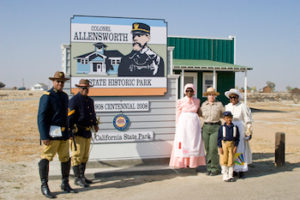
Allensworth, CA.
On this date, we celebrate the founding of Allensworth, California, in 1908. This was one of many Black Towns in America.
On this date, Allen Allensworth, a former soldier, and William Payne, a teacher, created the California Colony and Home Promoting Association, with offices in the San Fernando Building on Main Street and in downtown Los Angeles. Others who also played significant roles in the colony's founding were John W. Palmer, a miner; William H. Peck, a minister; and Harry A. Mitchell, a real estate agent. The Pacific Farming Company, a white-owned rural land development firm, offered the association prime land in Solito, a rural area in Tulare County, 30 miles north of Bakersfield.
Quickly renamed, Allensworth proved to be a suitable site for the colony. It had a depot station on the main Santa Fe Railroad line from Los Angeles to San Francisco. The soil was fertile, the water seemingly abundant, and the acreage was plentiful and reasonably priced. Many colony residents, including Colonel Allensworth, were initially surprised but gratified that a white company had aided them. Yet within five years, the Pacific Farming Company would become the colony's adversary in a water controversy. The period from 1912 to 1915 marked the apex of Allensworth as a thriving community. African American newspapers throughout the nation took note of the tiny hamlet.
The New York Age chronicled its growth, the Washington Bee congratulated all involved with the enterprise, and the California Eagle gleefully exclaimed, "There is not a single white person having anything to do with the affairs of the colony.” Even the Los Angeles Times took note, labeling Allensworth "an ideal Negro settlement.”
The national Black community was starved of racial honor. Positive actions such as those taken by Allensworth residents were one way to portray Blacks more favorably. Additionally, during this period, the town of Allensworth had a favorable impact on the surrounding area's economic and political structure. Sources, such as the Oakland Sun (a leading San Francisco Bay Area Black newspaper), claimed that in 1913, the citizens of Allensworth generated nearly $5,000 monthly from their business ventures.
Politically, Allensworth became a member of the county school district and the regional library system. A voting precinct elected the first African American Justice of the Peace in post-Mexican California. In 1914, the California Eagle reported that the Allensworth community comprised 900 acres of deeded land, valued at more than $112,500. Allensworth became a town, not just a colony. During Allensworth's golden age, the social and educational organizations were the Owl Club, the Campfire Girls, the Girls' Glee Club, and the Children's Saving Association. They met the needs of the young, while adults participated in the Sewing Circle, the Whist Club, the Debating Society, and the Theater Club.
The Girls' Glee Club, modeled after the internationally known Jubilee Singers of Fisk University, was the community's pride and joy. Another element in Allensworth's development of the sense of communal responsibility was the struggle to establish a state-supported industrial school.
Early in 1914, Colonel Allensworth lobbied for an educational institute based on the model pioneered by Booker T. Washington’s Tuskegee Institute, but it was not to be. The Pacific Farming Company and others had duped the lobbyists. Almost immediately, the Allensworth colony faced several crises that led to its eventual decline. In 1914, the Santa Fe Railroad, never a supporter of the Black community, built a spur line to neighboring Alpaugh, thereby allowing most rail traffic to bypass Allensworth and depriving the town of its lucrative carrying trade.
Santa Fe's decision culminated in racist conflicts between Allensworth and the railroad. Initially, the rail line refused to change the depot's name from Solito/Solita to Allensworth. The corporation also refused to hire Black managers or ticket agents for the station located in the colony, despite repeated letters and recriminations.
Moreover, the community continued to reel under the long-standing water problem. As part of the initial purchase, the Pacific Farming Company had agreed to supply sufficient water for irrigation, regardless of the town's eventual growth. Still, as early as 1910, the Pacific Farming Company failed to honor its commitment. Eventually, the community sought and gained legal redress: the control of the Allensworth Water Company passed to the town. But it was too late because the city now owned an outdated water system and had the unexpected burden of massive, unpaid taxes. Not until 1918 was the community able to rid itself of the tax burden and begin to upgrade the pumping machinery, but by then, the water table had dropped too low, and the equipment was ineffective.
But the single most critical factor in the community's decline was the death of Allen Allensworth. On September 13, 1914, he was struck by a speeding motorcycle and died the next morning. By 1920, the two leading figures, William Payne and Josephine Allensworth, had left the area. Payne had accepted a teaching job at El Centro while Mrs. Allensworth returned to Los Angeles to live with her daughter, Nella. The exodus continued during the Great Depression and World War II. The lure of jobs in Oakland and other war industry sites further decimated the town's population, and in 1966, arsenic was found in its water supply.
This seemed to sound like the death knell for Allensworth. In May 1976, the state Department of Parks and Recreation approved the plans to develop the park, and on October 6, 1976, the park was indeed dedicated—so the colonel's dream, if not his colony, endured. The community of Allensworth was the first and only all-Black town in the history of California. What matters now is that everyone discovers the depths of character and vision of those who, through their attempt to build a colony, sought to provide an opportunity for men and women to transcend race-based limitations and thus control their destinies.